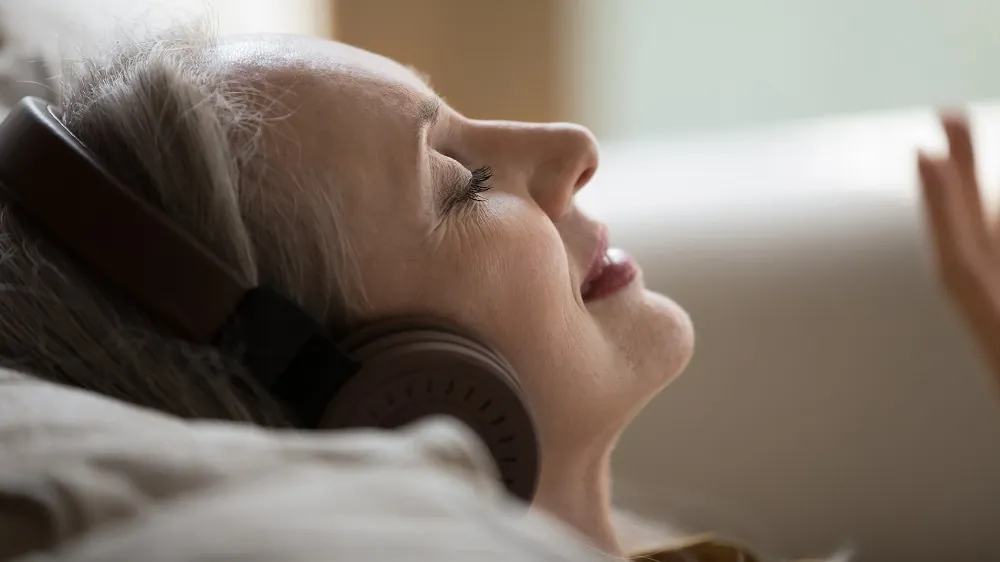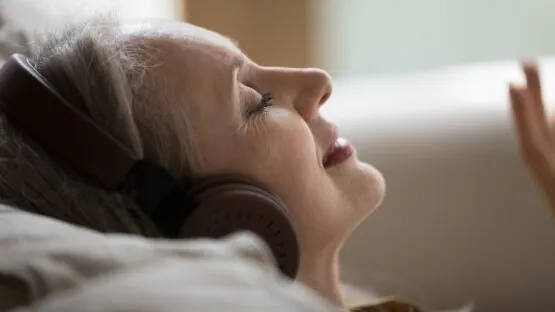The authors of a new review have analyzed randomized controlled trials that evaluated the impact of music therapy on the cognitive functions of people with Alzheimer’s [1].
Music to Alzheimer’s patients’ ears
Current pharmacology lacks a long-term method of effectively managing Alzheimer’s disease symptoms. Therefore, researchers have been looking into non-pharmacological therapies for treating these symptoms. One of these alternatives is music therapy [2].
The American Music Therapy Association describes music therapy as the use of music interventions in a clinical and evidence-based manner to achieve specific goals, which are tailored to the individual, by a professional who is credentialed and has completed an approved music therapy program.
Research on music therapy has reported positive effects on emotion modulation and social communication. It has also been found to affects some brain networks by inducing plastic changes in those networks [3]. In patients who feel isolated, music therapy can lead to a feeling of connection and socialization. It can also help improve mood, cognitive functions, and memory [4].
There are two approaches to music therapy: active and receptive. Active musical intervention techniques require more engagement, such as improvisation, singing, playing an instrument, clapping, or dancing. On the other hand, the receptive version merely involves listening to music [5].
Previous research on active music interventions has found that they can improve cognitive functions and reduce agitation and anxiety. Meanwhile, the receptive version has been found to aid in relaxation, stress reduction, and sleep quality [3].
Singing seems to have an effect on Alzheimer’s symptoms
The researchers analyzed eight studies that included 689 participants from the USA, Europe, and Asia. The mean ages of participants in those studies were between 60.5 and 87.1, with Alzheimer’s disease stages varying from mild to severe. The musical approaches also varied in those studies and included singing with played songs, listening to music, and other active and passive approaches [6-13].
All but one study concluded that music therapy had a significant, positive impact on Alzheimer’s disease patients’ cognitive function. The positive results reported improvement in orientation, language, memory, verbal fluency, and the emotional state of the patients. The improvements in the emotional state didn’t last longer than 3 weeks after the therapy; other effects lasted longer and were still observed after the follow-up, which varied between 1 month and 6 months.
Further analysis revealed that active therapy had better results than the receptive version. Still, the two studies that only used receptive methods showed positive effects on cognitive functions.
The review’s authors elaborate that the lack of association between cognition and music therapy in one of the analyzed studies might be due to a few reasons. First, in that study, the therapist chose the music used during the therapy, and it was not based on the participant’s preference. Second, the control group was a group of participants who participated in a cooking activity rather than no intervention. Third, there might not have been enough participants to report significant results.
Potential and limitations
The authors list many advantages of employing music therapy in treating symptoms of Alzheimer’s disease, including its easy implementation, affordability, lack of side effects, and non-invasive nature. Additionally, multiple Alzheimer’s Disease symptoms can be addressed simultaneously.
However, the cognitive and physical abilities of patients with severe dementia might prevent them from taking part, thus limiting its implementation to patients with less advanced stages of the disease. Additionally, the trained therapists required for music therapy might not be available everywhere.
The authors also point to some of the limitations of the review. The studies included in the review are quite heterogeneous, as their implementations of music therapy differed in kind and duration. They also measured different outcomes in participants of different ages and with different disease severities..
Those limitations and the small number of studies analyzed don’t allow the authors to offer any recommendations regarding best practices or practical implementation as to which types of interventions or music might be best for Alzheimer’s patients. They concluded as follows:
The findings of this review suggest that music therapy could have a positive impact on cognitive functions in patients with AD. This supports the growing body of evidence that targets music therapy as a promising cognitive rehabilitating process aiming to improve cognitive functions in individuals with AD dementia, like memory, executive functions, or attention. Improvements in these cognitive functions can, in turn, enhance the quality of life of both the patients and their caregivers. However, more research is needed to fully understand the mechanisms behind these effects and to determine the optimal approach to music therapy for this population, including the time frame for follow-up evaluations.
If you found this interesting and want to find out more about the potential of music to treat Alzheimer’s, check out this Stranger Things video we made below.
Literature
[1] Bleibel, M., El Cheikh, A., Sadier, N. S., & Abou-Abbas, L. (2023). The effect of music therapy on cognitive functions in patients with Alzheimer’s disease: a systematic review of randomized controlled trials. Alzheimer’s research & therapy, 15(1), 65.
[2] Särkämö, T., Tervaniemi, M., Laitinen, S., Numminen, A., Kurki, M., Johnson, J. K., & Rantanen, P. (2014). Cognitive, emotional, and social benefits of regular musical activities in early dementia: randomized controlled study. The Gerontologist, 54(4), 634–650.
[3] Schlaug G. (2009). Part VI introduction: listening to and making music facilitates brain recovery processes. Annals of the New York Academy of Sciences, 1169, 372–373.
[4] Raglio, A., Attardo, L., Gontero, G., Rollino, S., Groppo, E., & Granieri, E. (2015). Effects of music and music therapy on mood in neurological patients. World journal of psychiatry, 5(1), 68–78.
[5] Raglio, A., & Oasi, O. (2015). Music and health: what interventions for what results?. Frontiers in psychology, 6, 230.
[6] Sakamoto, M., Ando, H., & Tsutou, A. (2013). Comparing the effects of different individualized music interventions for elderly individuals with severe dementia. International psychogeriatrics, 25(5), 775–784.
[7] Narme, P., Clément, S., Ehrlé, N., Schiaratura, L., Vachez, S., Courtaigne, B., Munsch, F., & Samson, S. (2014). Efficacy of musical interventions in dementia: evidence from a randomized controlled trial. Journal of Alzheimer’s disease : JAD, 38(2), 359–369.
[8] Gómez Gallego, M., & Gómez García, J. (2017). Music therapy and Alzheimer’s disease: Cognitive, psychological, and behavioural effects. Musicoterapia en la enfermedad de Alzheimer: efectos cognitivos, psicológicos y conductuales. Neurologia (Barcelona, Spain), 32(5), 300–308.
[9] Pongan, E., Tillmann, B., Leveque, Y., Trombert, B., Getenet, J. C., Auguste, N., Dauphinot, V., El Haouari, H., Navez, M., Dorey, J. M., Krolak-Salmon, P., Laurent, B., Rouch, I., & LACMé Group (2017). Can Musical or Painting Interventions Improve Chronic Pain, Mood, Quality of Life, and Cognition in Patients with Mild Alzheimer’s Disease? Evidence from a Randomized Controlled Trial. Journal of Alzheimer’s disease : JAD, 60(2), 663–677.
[10] Innes, K. E., Selfe, T. K., Brundage, K., Montgomery, C., Wen, S., Kandati, S., Bowles, H., Khalsa, D. S., & Huysmans, Z. (2018). Effects of Meditation and Music-Listening on Blood Biomarkers of Cellular Aging and Alzheimer’s Disease in Adults with Subjective Cognitive Decline: An Exploratory Randomized Clinical Trial. Journal of Alzheimer’s disease : JAD, 66(3), 947–970.
[11] Lyu, J., Zhang, J., Mu, H., Li, W., Champ, M., Xiong, Q., Gao, T., Xie, L., Jin, W., Yang, W., Cui, M., Gao, M., & Li, M. (2018). The Effects of Music Therapy on Cognition, Psychiatric Symptoms, and Activities of Daily Living in Patients with Alzheimer’s Disease. Journal of Alzheimer’s disease : JAD, 64(4), 1347–1358.
[12] Wang Z, Li Z, Xie J, Wang T, Yu C, An N. (2018) Music therapy improves cognitive function and behavior in patients with moderate Alzheimer’s disease. Int J Clin Exp Med. 2018;11(5):4808–14.
[13] Gómez-Gallego, M., Gómez-Gallego, J. C., Gallego-Mellado, M., & García-García, J. (2021). Comparative Efficacy of Active Group Music Intervention versus Group Music Listening in Alzheimer’s Disease. International journal of environmental research and public health, 18(15), 8067.






